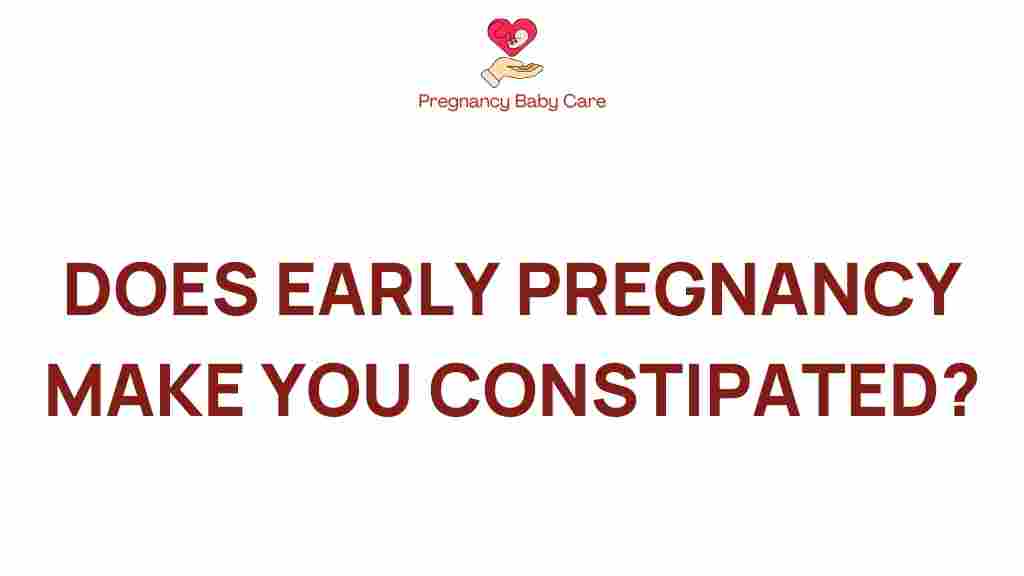The Surprising Link Between Early Pregnancy and Constipation
Early pregnancy is a time of profound change for many women. While most expectant mothers are aware of common symptoms such as nausea and fatigue, one often overlooked issue is constipation. This article delves into the surprising link between early pregnancy and constipation, exploring the underlying causes, symptoms, and tips for managing digestive health during this critical period.
Understanding Early Pregnancy and Its Symptoms
Early pregnancy typically refers to the first trimester, which lasts from weeks 1 to 12. During this period, a woman’s body undergoes significant changes due to hormonal fluctuations. Understanding these changes is crucial for recognizing symptoms like constipation.
Hormonal Changes and Their Impact on Digestive Health
One of the primary reasons for constipation in early pregnancy is the surge in hormones, particularly progesterone. This hormone plays a vital role in maintaining pregnancy but also affects the digestive system. Here’s how:
- Progesterone Relaxation: Progesterone relaxes smooth muscles, which includes the muscles in the gastrointestinal tract. This relaxation slows down digestion.
- Increased Water Absorption: Slower digestion leads to more water being absorbed from the stool, making it harder and more difficult to pass.
- Pressure on the Intestines: As the uterus expands, it can exert pressure on the intestines, further complicating bowel movements.
Common Symptoms of Constipation in Early Pregnancy
Constipation can manifest in various ways. Recognizing these symptoms early can help in managing them effectively:
- Infrequent bowel movements (fewer than three times a week)
- Hard or lumpy stools
- Pain or discomfort during bowel movements
- Abdominal bloating and discomfort
- Feeling of incomplete evacuation after a bowel movement
Managing Constipation: Pregnancy Tips for Digestive Wellness
Addressing constipation in early pregnancy is essential for overall digestive health and well-being. Here are some effective strategies:
1. Stay Hydrated
Drinking plenty of water is crucial. Aim for at least 8-10 cups of water daily. Staying hydrated helps soften stool and promotes regular bowel movements.
2. Increase Fiber Intake
A high-fiber diet can significantly improve digestive health. Include the following fiber-rich foods:
- Fruits (e.g., apples, pears, berries)
- Vegetables (e.g., broccoli, spinach, carrots)
- Whole grains (e.g., oats, whole wheat bread, brown rice)
- Legumes (e.g., beans, lentils, chickpeas)
3. Regular Exercise
Physical activity can stimulate digestion and help alleviate constipation. Aim for at least 30 minutes of moderate exercise most days of the week. Activities like walking, swimming, and prenatal yoga can be beneficial.
4. Establish a Routine
Try to set a regular schedule for bowel movements. This can help train your body to recognize when it’s time to go. Consider using the bathroom at the same time each day, particularly after meals.
5. Listen to Your Body
Don’t ignore the urge to go. Responding promptly can help prevent constipation from worsening.
When to Seek Help for Gastrointestinal Issues
While mild constipation can often be managed with lifestyle changes, there are times when it is essential to seek medical advice:
- If you experience severe pain or cramping
- If constipation is accompanied by bleeding
- If you notice unexplained weight loss
- If you have persistent symptoms despite lifestyle changes
In such cases, a healthcare provider may recommend safe medications or treatments suitable for pregnant women.
Troubleshooting Constipation in Early Pregnancy
Here are some additional tips to troubleshoot constipation during early pregnancy:
1. Monitor Your Diet
Keep a food diary to identify any foods that may worsen your constipation or trigger gastrointestinal issues. Adjusting your diet can lead to significant improvements.
2. Consider Probiotics
Probiotics can promote healthy gut bacteria and improve digestion. Foods like yogurt, kefir, and fermented vegetables are excellent sources. Consult your healthcare provider before starting any supplements.
3. Use a Footstool
When using the toilet, consider placing your feet on a small stool. This position can help align the intestines for easier bowel movements.
4. Practice Relaxation Techniques
Stress can exacerbate digestive issues. Engage in relaxation practices such as deep breathing, meditation, or prenatal yoga to help manage stress levels.
Conclusion: Embracing Digestive Health During Early Pregnancy
In conclusion, understanding the surprising link between early pregnancy and constipation is vital for maintaining digestive health. Hormonal changes, body changes, and the strain of a growing uterus can contribute to gastrointestinal issues during this period. By implementing effective strategies such as staying hydrated, increasing fiber intake, and exercising regularly, expectant mothers can enhance their well-being.
If you experience persistent constipation or gastrointestinal issues, do not hesitate to consult your healthcare provider for advice tailored to your specific needs. Remember, taking care of your digestive health is an essential part of a healthy pregnancy journey.
For more information on pregnancy health and wellness tips, check out this resource. And for a deeper understanding of digestive health, visit this informative site.
This article is in the category Pregnancy and created by PregnancyBabyCare Team
